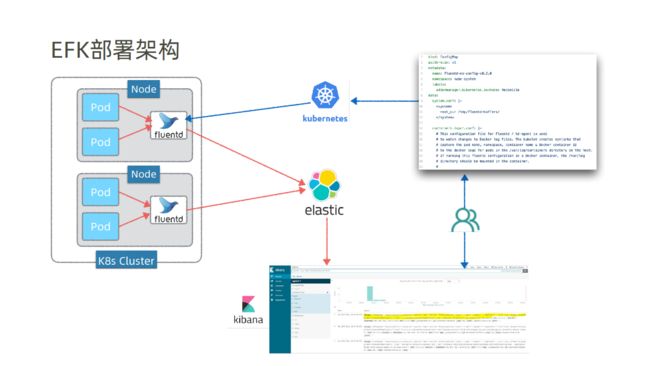微服务实践之构建EFK日志监控平台
- 基于
Elasticsearch+Fluentd+Kibana
上线流程
- 基于
Fluentd需要在每个主机节点上部署一个DaemonSet,Fluentd负责采集所有节点上的日志,主要采集容器控制、容器本身、操作系统的日志,然后定期传入到Es当中。关于DaemonSet了解
资源清单
从以下yaml文件中获取Kubernetes部署资源。
Kibana 7.5.1
kind: Deployment
apiVersion: apps/v1
metadata:
name: kibana-kibana
namespace: default
labels:
app: kibana
app.kubernetes.io/managed-by: Helm
heritage: Helm
release: kibana
annotations:
deployment.kubernetes.io/revision: '1'
meta.helm.sh/release-name: kibana
meta.helm.sh/release-namespace: default
spec:
replicas: 1
selector:
matchLabels:
app: kibana
release: kibana
template:
metadata:
creationTimestamp: null
labels:
app: kibana
release: kibana
spec:
containers:
- name: kibana
image: 'docker.elastic.co/kibana/kibana:7.5.1'
ports:
- name: http-kibana
containerPort: 5601
protocol: TCP
env:
- name: ELASTICSEARCH_HOSTS
value: 'http://elasticsearch-master:9200'
- name: SERVER_HOST
value: 0.0.0.0
- name: NODE_OPTIONS
value: '--max-old-space-size=1800'
resources: {}
readinessProbe:
exec:
command:
- sh
- '-c'
- >
#!/usr/bin/env bash -e
# Disable nss cache to avoid filling dentry cache when calling
curl
# This is required with Kibana Docker using nss < 3.52
export NSS_SDB_USE_CACHE=no
http () {
local path="${1}"
set -- -XGET -s --fail -L
if [ -n "${ELASTICSEARCH_USERNAME}" ] && [ -n "${ELASTICSEARCH_PASSWORD}" ]; then
set -- "$@" -u "${ELASTICSEARCH_USERNAME}:${ELASTICSEARCH_PASSWORD}"
fi
STATUS=$(curl --output /dev/null --write-out "%{http_code}" -k "$@" "http://localhost:5601${path}")
if [[ "${STATUS}" -eq 200 ]]; then
exit 0
fi
echo "Error: Got HTTP code ${STATUS} but expected a 200"
exit 1
}
http "/app/kibana"
initialDelaySeconds: 10
timeoutSeconds: 5
periodSeconds: 10
successThreshold: 3
failureThreshold: 3
terminationMessagePath: /dev/termination-log
terminationMessagePolicy: File
imagePullPolicy: IfNotPresent
securityContext:
capabilities:
drop:
- ALL
runAsUser: 1000
runAsNonRoot: true
restartPolicy: Always
terminationGracePeriodSeconds: 30
dnsPolicy: ClusterFirst
securityContext:
fsGroup: 1000
schedulerName: default-scheduler
strategy:
type: Recreate
revisionHistoryLimit: 10
progressDeadlineSeconds: 600
Fluentd latest
DockerHub-Fluentd官网
FLUENT_ELASTICSEARCH_HOST: 指定elastic主机地址FLUENT_ELASTICSEARCH_PORT: 指定elastic端口FLUENT_ELASTICSEARCH_SSL_VERIFY: 是否验证SSL证书(可以不开)FLUENT_ELASTICSEARCH_SSL_VERSION: TLS版本(可以不开)
apiVersion: apps/v1
kind: DaemonSet
metadata:
name: fluentd
namespace: kube-system
labels:
k8s-app: fluentd-logging
version: v1
kubernetes.io/cluster-service: "true"
spec:
selector:
matchLabels:
k8s-app: fluentd-logging
version: v1
template:
metadata:
labels:
k8s-app: fluentd-logging
version: v1
kubernetes.io/cluster-service: "true"
spec:
serviceAccount: fluentd
serviceAccountName: fluentd
tolerations:
- key: node-role.kubernetes.io/master
effect: NoSchedule
containers:
- name: fluentd
image: fluent/fluentd-kubernetes-daemonset:v1-debian-elasticsearch
env:
- name: FLUENT_ELASTICSEARCH_HOST
value: "elasticsearch-master-headless.default" # 地址写headless.名称空间
- name: FLUENT_ELASTICSEARCH_PORT
value: "9200"
- name: FLUENT_ELASTICSEARCH_SCHEME
value: "http"
- name: FLUENT_UID
value: "0"
- name: FLUENTD_SYSTEMD_CONF
value: disable
resources:
limits:
memory: 200Mi
requests:
cpu: 100m
memory: 200Mi
volumeMounts:
- name: varlog
mountPath: /var/log
- name: varlibdockercontainers
mountPath: /var/lib/docker/containers
readOnly: true
terminationGracePeriodSeconds: 30
volumes:
- name: varlog
hostPath:
path: /var/log
- name: varlibdockercontainers
hostPath:
path: /var/lib/docker/containers
fluentd-elasticsearch-rbac
---
apiVersion: v1
kind: ServiceAccount
metadata:
name: fluentd
namespace: kube-system
---
apiVersion: rbac.authorization.k8s.io/v1
kind: ClusterRole
metadata:
name: fluentd
rules:
- apiGroups:
- ""
resources:
- pods
- namespaces
verbs:
- get
- list
- watch
ElasticSearch 7.5.1
我这个Es直接用Skywalking的配置了,你们有需要的话自己修改一下yaml配置就行。
kind: StatefulSet
apiVersion: apps/v1
metadata:
name: elasticsearch-master
namespace: default
labels:
app: elasticsearch-master
app.kubernetes.io/managed-by: Helm
chart: elasticsearch
heritage: Helm
release: skywalking
annotations:
esMajorVersion: '7'
meta.helm.sh/release-name: skywalking
meta.helm.sh/release-namespace: default
spec:
replicas: 3
selector:
matchLabels:
app: elasticsearch-master
template:
metadata:
name: elasticsearch-master
creationTimestamp: null
labels:
app: elasticsearch-master
chart: elasticsearch
heritage: Helm
release: skywalking
spec:
initContainers:
- name: configure-sysctl
image: 'docker.elastic.co/elasticsearch/elasticsearch:7.5.1'
command:
- sysctl
- '-w'
- vm.max_map_count=262144
resources: {}
terminationMessagePath: /dev/termination-log
terminationMessagePolicy: File
imagePullPolicy: IfNotPresent
securityContext:
privileged: true
runAsUser: 0
containers:
- name: elasticsearch
image: 'docker.elastic.co/elasticsearch/elasticsearch:7.5.1'
ports:
- name: http
containerPort: 9200
protocol: TCP
- name: transport
containerPort: 9300
protocol: TCP
volumeMounts:
- name: datadir
mountPath: /usr/share/elasticsearch/data
env:
- name: node.name
valueFrom:
fieldRef:
apiVersion: v1
fieldPath: metadata.name
- name: cluster.initial_master_nodes
value: >-
elasticsearch-master-0,elasticsearch-master-1,elasticsearch-master-2,
- name: discovery.seed_hosts
value: elasticsearch-master-headless
- name: cluster.name
value: elasticsearch
- name: network.host
value: 0.0.0.0
- name: ES_JAVA_OPTS
value: '-Xmx1g -Xms1g'
- name: node.data
value: 'true'
- name: node.ingest
value: 'true'
- name: node.master
value: 'true'
resources:
limits:
cpu: '1'
memory: 2Gi
requests:
cpu: 100m
memory: 2Gi
readinessProbe:
exec:
command:
- sh
- '-c'
- >
#!/usr/bin/env bash -e
# If the node is starting up wait for the cluster to be ready
(request params: 'wait_for_status=green&timeout=1s' )
# Once it has started only check that the node itself is
responding
START_FILE=/tmp/.es_start_file
http () {
local path="${1}"
if [ -n "${ELASTIC_USERNAME}" ] && [ -n "${ELASTIC_PASSWORD}" ]; then
BASIC_AUTH="-u ${ELASTIC_USERNAME}:${ELASTIC_PASSWORD}"
else
BASIC_AUTH=''
fi
curl -XGET -s -k --fail ${BASIC_AUTH} http://127.0.0.1:9200${path}
}
if [ -f "${START_FILE}" ]; then
echo 'Elasticsearch is already running, lets check the node is healthy and there are master nodes available'
http "/_cluster/health?timeout=0s"
else
echo 'Waiting for elasticsearch cluster to become cluster to be ready (request params: "wait_for_status=green&timeout=1s" )'
if http "/_cluster/health?wait_for_status=green&timeout=1s" ; then
touch ${START_FILE}
exit 0
else
echo 'Cluster is not yet ready (request params: "wait_for_status=green&timeout=1s" )'
exit 1
fi
fi
initialDelaySeconds: 10
timeoutSeconds: 5
periodSeconds: 10
successThreshold: 3
failureThreshold: 3
terminationMessagePath: /dev/termination-log
terminationMessagePolicy: File
imagePullPolicy: IfNotPresent
securityContext:
capabilities:
drop:
- ALL
runAsUser: 1000
runAsNonRoot: true
restartPolicy: Always
terminationGracePeriodSeconds: 120
dnsPolicy: ClusterFirst
securityContext:
runAsUser: 1000
fsGroup: 1000
affinity:
podAntiAffinity:
requiredDuringSchedulingIgnoredDuringExecution:
- labelSelector:
matchExpressions:
- key: app
operator: In
values:
- elasticsearch-master
topologyKey: kubernetes.io/hostname
schedulerName: default-scheduler
volumeClaimTemplates:
- metadata:
name: datadir
annotations:
volume.beta.kubernetes.io/storage-class: "managed-nfs-storage"
spec:
accessModes: ["ReadWriteMany"]
resources:
requests:
storage: 10Gi
serviceName: elasticsearch-master-headless
podManagementPolicy: Parallel
updateStrategy:
type: RollingUpdate
revisionHistoryLimit: 10
